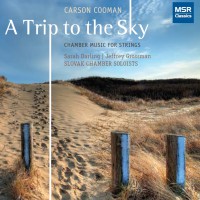Opus 855
Quartet for Piano and Strings (A Sea Liturgy) (2009)
for Piano Quartet
Nora Skuta, piano; Zwiebel Quartet
Duration: 16 min.
Dedication: for the Arcturus Chamber Ensemble on its 10th anniversary
Commission: Commissioned by the Moscow Studio for New Music and the Arcturus Chamber Ensemble
 Recorded on A Trip to the Sky: Chamber Music for Strings (2011)
Recorded on A Trip to the Sky: Chamber Music for Strings (2011)Publisher: Musik Fabrik
Performance materials available from the publisher.
Quartet for Piano and Strings (A Sea Liturgy) (2009) was jointly commissioned for the Moscow Studio for New Music and the Arcturus Chamber Ensemble (Sarah Darling, artistic director). It is dedicated to the Arcturus Chamber Ensemble on its 10th anniversary.
The work is cast in a single movement and is conceived as a “sea liturgy.” It attempts to conjure up an imagined set of spiritual rituals (not connected to any specific religion)—a ceremony of transformation and renewal performed in the context of a sea landscape.
Though not broken into movements, the formal design of the work could be seen as follows:
Processional — (Ritornello) — Invocation — Offering — (Ritornello) — Baptism — Rebirth — Recessional
As with so many of my works, much of the initial musical planning took place in the context of the oceanscapes of Nantucket Island, Massachusetts. Those particular sea landscape were foremost in my mind while writing. The listener may also discard the imagined liturgical apparatus and simply listen to the work as a series of seascapes. (For the purposes of narrative clarity, the above section descriptors will be used in the below narrative.)
The opening Processional begins with focused, austere intensity: the instruments unfold from a single pitch (E) into a more rich harmonic landscape. A Ritornello of pulsating string harmonics leads into Invocation, a warmly lyrical discourse. The Offering is a faster, jubilant development of the Invocation, where the prayerful melodies of the Invocation are transformed into a gift for the sea. A return of the Ritornello leads to the Baptism. In this section, heterophonic melodies unfold out of the new substrate pitch (D). In the transforming crucible of the water, these lines becomes more and more extended harmonically. The Rebirth is a dancing development of the Baptism; the harmonic extensions are pushed from dissonance into chords of pure joy. Emerging out of the afterglow of the Rebirth is the Recessional, in which the music of the Processional is revisited, now transformed by the ritual to center on the pitch D. The Recessional fades away peacefully, yet fervently.
